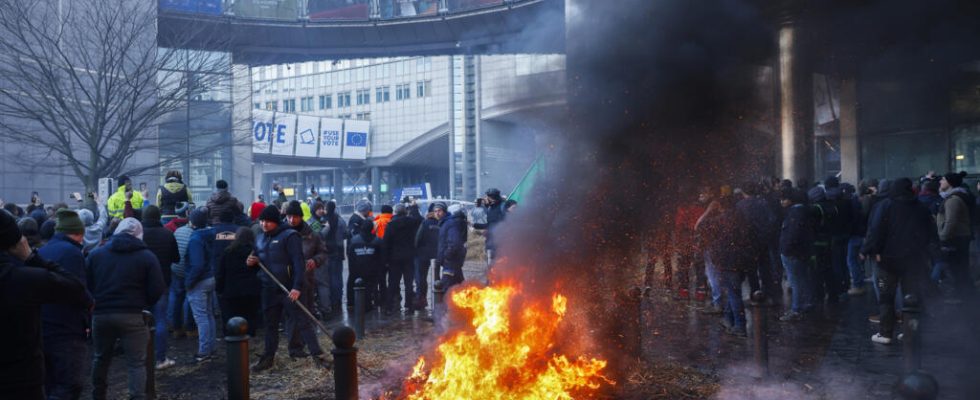While the Twenty-Seven met this Thursday in Brussels for an extraordinary summit devoted mainly to financing aid to Ukraine, Belgian farmers descended in numbers on the European district of the Belgian capital to make their demands heard and relay those of their European colleagues.
5 mins
“ No farmers, no food! » Thousands of demonstrators from several European countries and more than 1,200 tractors managed to paralyze a large part of the European district of Brussels. In front of the European Parliament, they threw eggs, burned bales of straw and tires to denounce the reforms and burdens of the Common Agricultural Policy and its new greening, biodiversity and fallow objectives. They also protest against imports from countries outside the European Union or against CAP red tape.
“ We want mirror effects on imports, particularly from Mercosur or other regions of the world, where they produce with constraints that are absolutely not the same as ours. And these imported food products end up on your plate », argues Pierre André, farmer in the Condroz region, speaking to our correspondent in Brussels, Pierre Benazet.
The Twenty-Seven divided on the agreement with Mercosur
Since the start of the farmers’ movement, Mercosur has been on everyone’s lips. The free trade agreement negotiated between the European Union and Brazil, Argentina, Uruguay and Paraguay is a scarecrow for the European agricultural sector which sees it as unfair competition. Brussels recognized at the start of the week that “ conditions were not met » to sign it as is. It must be said that the 27 are divided on the issue, notes our special correspondent in Brussels, Anastasia Becchio.
Read alsoWhy the agreement between Mercosur and the European Union fuels the anger of farmers
Among the most virulent detractors of the moment: Emmanuel Macron. “ France opposes and will continue to oppose » to the conclusion of a trade agreement with Mercosur, he insisted at the end of the European Council. “ I’m not against trade agreements by definition, I’m simply against free trade when it’s the law of the jungle. This is not my vision of things. I do not share the political lessons of people who come from political families who are not necessarily ultra-liberal, but who defend agreements whose underlying elements are ultra-liberal. », Said the French president.
A dig that could be addressed to Pedro Sanchez, the Spanish Prime Minister from the Socialist Workers Party, or to the German Social Democratic Chancellor Olaf Scholz who, in the neighboring press room, had a completely different vision of things: “ I want more free trade agreements, I regret the slowness and hesitation with which these things are moving, and this also applies to this Mercosur agreement, negotiated for so long. »
The concessions announced by the Commission on Wednesday on fallow land and possible customs duties on Ukrainian foodstuffs did not prevent discontent from gaining ground. In Greece, 300 tractors and dozens of beekeepers’ trucks, honking their horns and displaying black and white flags, stopped this Thursday in front of the municipal center of Thessaloniki, Greece’s second city, shouting: “ Farmers, they drink your blood “. In Alsace, in eastern France, German farmers symbolically joined their counterparts not far from the border to make their common demands heard. After new announcements from Prime Minister Gabriel Attal, the main French agricultural unions finally called for the lifting of blockades. While remaining on their guard.
Towards an end to the crisis in Portugal?
In Portugal, hundreds of farmers blocked several roads this morning, including two crossings at the border with Spain, in order to demand ” valorization of their activity “. The origin of their anger: the announcement on January 24 of clear cuts in the aid paid to them, in particular the elimination of an envelope of 62 million euros which was promised within the framework of the CAP for the payment of ecological schemes, organic farming and integrated production.
Two days ago, in an attempt to defuse the anger, the Minister of Agriculture announced the release of 500 million euros, including 200 million to minimize the impact of the drought which is affecting the entire country, particularly the south. After a new meeting this Thursday with the Ministry of Agriculture which made it possible to guarantee the payment of the aid initially canceled, farmers said they were ready to consider lifting the blockade, reports our correspondent in Lisbon, Marie-Line Darcy.
On the sidelines of their summit mainly devoted to aid to Ukraine, the 27 considered new measures to respond to this European agricultural crisis, such as controlling imports of Ukrainian cereals. But above all, the Commission will present proposals by February 26 to reduce the administrative burden on farmers. As for the agreement with Mercosur, if the subject is suspended, it is not closed. Earlier this week, the European Commission announced that it was continuing ongoing negotiations. Its president Ursula von der Leyen now promises to protect EU farmers during trade negotiations “ by ensuring a level playing field in terms of standards “.
(And with AFP)
